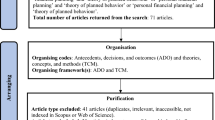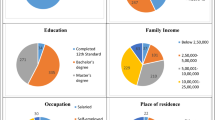Abstract
Financial industry data indicate that consumers increasingly prefer debit cards over credit cards, especially as a means of enforcing financial self-discipline. Given prior research suggesting that credit cards act as spending facilitating stimuli, this move toward reduced credit card use would appear to be in the right direction. Ironically, however, the same logos that were implicated in facilitating spending with credit cards are the logos that appear on debit cards. In what should serve as an eye-opener to consumers, it is found that exposure to debit card logos does result in an increased willingness to spend, similar to credit cards.

Similar content being viewed by others
Notes
The six items were selected on the basis of a pre-test. The pre-test consisted of an unaided recall task in which each of the 15 individuals made a list of as many gift items as he/she could remember that they had purchased recently along with the price (or price range) they had paid. Based on the responses from the pre-test, we selected six items that were most frequently mentioned and whose price range overlapped the most across respondents.
The following statements with a 7-point strongly agree–strongly disagree scale were used: I would describe myself as being aware of prices in general; I would describe myself as being careful with spending money; I feel that most things are over-priced; I find myself spending too much money.
For the contrasts, we tested the hypothesis of equality of variances using the Levene test. Since the Levene statistic was significant for all items (all p < .001), which indicates unequal variances, we report the results of the contrast tests corresponding to the unequal-variance t test.
Lie et al. (2010) found a “reverse” credit card effect in which credit cards inhibited spending, ascribed to New Zealand student subjects' negative associations with credit cards.
References
Bornstein, R. F. (1989). Exposure and affect: Overview and meta-analysis of research, 1968–1987. Psychological Bulletin, 106(2), 265–289.
Edgar Dunn & Company. (2004, January 27). Consumers choose debit cards as most preferred card in their wallets [Press Release]. Retrieved from http://www.directiveanalytics.com/pdf/Consumers%20Choose%20Debit%20Cards%20As%20Most%20Preferred%20Card%20in%20The..pdf
Hunt, J. M., Florscheim, R., Chatterjee, A., & Kernan, J. (1990). Credit cards as spending facilitating stimuli: A test and extension of Feinberg's conditioning hypothesis. Psychological Reports, 67(1), 323–330.
Feinberg, R. A. (1986). Credit cards as spending facilitating stimuli: A conditioning interpretation. Journal of Consumer Research, 13(3), 348–356.
Feinberg, R. A. (1990). The social nature of classical conditioning phenomena in people: A comment on Hunt, Florscheim, Chatterjee, and Kernan. Psychological Reports, 67(1), 331–334.
Feinberg, R. A., & Meoli, J. (1987). The classical conditioning of credit card cues. Proceedings of the Division of Consumer Psychology, American Psychological Association 1986 Annual Conference, 138–140.
Foster, K., Meijer, E., Schuh, S., & Zabek, M. A. (2010). The 2008 survey of consumer payment choice. Public Policy Discussion Papers, Federal Reserve Bank of Boston, April 2010.
Leondis, A. (2010). Cardholders prefer debit as credit-card use declines. Bloomberg Businessweek, Sept. 08, 2010. Retrieved from http://www.businessweek.com/news/2010-09-08/cardholders-prefer-debit-as-credit-card-use-declines.html
Lie, C., Hunt, M., Peters, H., Veliu, B., & Harper, D. (2010). The “negative” credit card effect: Credit cards as spending-limiting stimuli in New Zealand. The Psychological Record, 60(3), 399–412.
McCall, M., & Belmont, H. J. (1996). Credit card insignia and restaurant tipping: Evidence for an associative link. Journal of Applied Psychology, 81(5), 609–613.
Palmeri, C. (2008). The steady ascent of the debit card. Bloomberg Business Week, Nov. 10, 2008. Retrieved from http://www.businessweek.com/magazine/content/08_45/b4107000370790.htm
Prelec, D., & Duncan, S. (2001). Always leave home without it: A further investigation of the credit-card effect on willingness to pay. Marketing Letters, 12(1), 5–12.
Raghubir, P., & Srivastava, J. (2008). Monopoly money: The effect of payment coupling and form on spending behavior. Journal of Experimental Psychology: Applied, 14(3), 213–225.
Shimp, T. A., & Moody, M. (2000). In search of a theoretical explanation for the credit card effect. Journal of Business Research, 48(1), 17–23.
Soman, D. (2001). Effects of Payment Mechanism on Spending Behavior: The Role of Rehearsal and Immediacy of Payments. Journal of Consumer Research, 27(4), 460–474.
Census Bureau, U. S. (2009). The 2010 Statistical Abstract: Banking, Finance, and Insurance. Washington, DC: U.S. Government Printing Office.
Visa Inc. (2009). Total U.S. Visa debit volume surpasses credit for the first time [Press Release, May 4]. Retrieved from http://investor.visa.com/phoenix.zhtml?c=215693&p=irol-newsArticle&ID=1283874&highlight=
Zajonc, R. B. (1968). Attitudinal effects of mere exposure. Journal of Personality and Social Psychology Monographs, 9(2), 1–27.
Zajonc, R. B. (2001). Mere exposure: A gateway to the subliminal. Current Directions in Psychological Science, 10(6), 224–228.
Author information
Authors and Affiliations
Corresponding author
Rights and permissions
About this article
Cite this article
Moore, A., Taylor, M. Time to Cut Up Those Debit Cards? Effect of Payment Mode on Willingness to Spend. J Consum Policy 34, 415–422 (2011). https://doi.org/10.1007/s10603-011-9172-7
Received:
Accepted:
Published:
Issue Date:
DOI: https://doi.org/10.1007/s10603-011-9172-7




